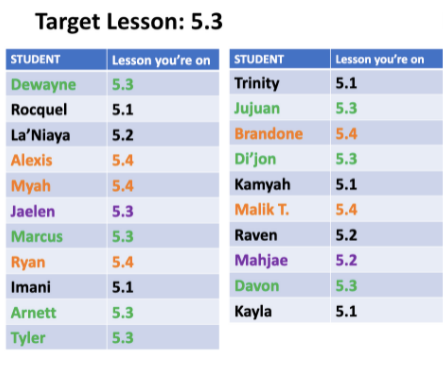Our Auto-Updating Progress Tracker
I want to share with you the story of a spreadsheet that is important to me.
In the summer of 2018, Kareem and I trained our first eight educators at Eastern High School in Washington, DC, where both of us taught. The ten of us met in person every day for a week. One day, we discussed a fundamental challenge of any self-paced classroom: How do you communicate each student's progress in a way that is both efficient and clear?
This was the tracker Kareem and I had developed. It was clear, but took a long time to update:
Fortunately, one of our colleagues was an English teacher who knew more than we did about spreadsheets. So the next day, she came in with something to show us. She'd taken our sample tracker and added two new columns for each student, which would update automatically to show:
1) Whether the student was on, ahead of, or behind the suggested pace.
2) What lesson the student should work on next.
Here's what her tracker looked like:
These small changes made a big difference. The auto-updating status and current-lesson columns saved this teacher a few seconds each time she checked a student's progress, and saved her students a few seconds each time they checked their own. But a few seconds saved each class became a few minutes saved each week, a few hours saved each month, and so on. Before long I was using my own version of this tracker, as were others at Eastern. When Kareem and I launched our free online course in the fall of 2019, we put it out there for the world to see.
As our community of teachers grew, so too did interest in this tracker. By the summer of 2020, Kareem and I were working full-time to support educators around the world, and they suggested all sorts of improvements. A science teacher in Colorado figured out how to group students by lesson. An elementary school teacher added must-do, should-do, and aspire-to-do labels. An arts teacher in Nigeria made the tabs easier to copy, so that a single spreadsheet could work for multiple classes. And so on, and so on. Together we've built a tracker that teachers around the world are using today:
This sheet is meant to be a useful tool. But to me it is so much more than that! In many ways, it represents everything that the Modern Classrooms Project is, and all that we aspire to be:
★ It's teacher-built. To my knowledge, everyone who has ever worked on improving this sheet is (or, in my case, has been) a classroom teacher.
★ It's practical. You can use this in your classroom tomorrow.
★ It's customizable. You can copy it and edit it and tailor it to your own particular needs.
★ It's getting better all the time. It still breaks sometimes, and teachers still want to use it in ways that we can't quite figure out how to make work. That only inspires us to make it better.
★ It's free. And it always will be.
When I think about where this sheet has come from - and where I hope, with your suggestions, it will continue to go - I think it's what our movement is all about: taking what works, learning from each other, and building, together, an approach that meets every student's needs.



